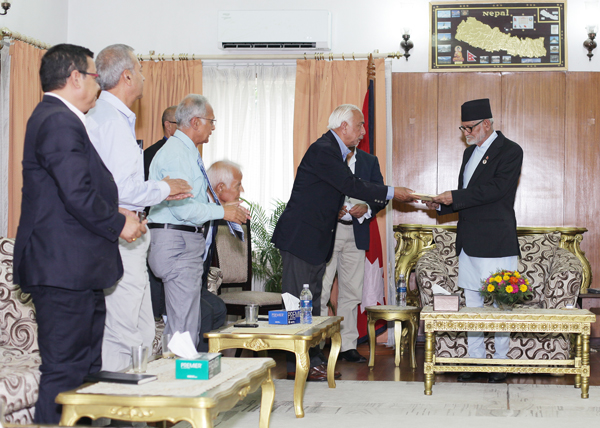Mathema-led task force submits report to PM
KATHMANDU: A high-level task force formed to address the anomalies plaguing medical education in the country has recommended that the government make ‘pro-active intervention’ to regulate the sector.
The two key recommendations of the task force are — making both government and private medical educational institutes enroll students only on the basis of merit and discouraging new medical colleges in the Kathmandu Valley.
The task force has recommended that the government fix the fee ceiling of MBBS at Rs 3.5 million. Currently, some medical colleges have been charging up to Rs 4.5 million for the five-year course.
The task force has also recommended formation of Health Education Council under the chairmanship of prime minister, which will look into the overall issues of the medical education sector.
The task force today handed over its report to Prime Minister Sushil Koirala at his official residence in Baluwatar.
After submitting the report, Kedar Bhakta Mathema, coordinator of the task force, said that the proposed HEC will look into the quality of health education, single entry exam, merit-based exam system and other issues to regulate the health education sector.
Mathema, who is also former vice chancellor of Tribhuvan University, said, “The report has suggested enrollment of only highly meritorious students through single entry exam.” Mathema stated that affiliation to new medical colleges was necessary, but the report has encouraged opening private medical colleges outside the Valley. “If the sector does not invest in medical colleges outside the Valley, the government should go to those places,” said Mathema.
“There should be overall development in the particular area where a medical college outside the Valley is established with the investment of the government,” added Mathema. “There are already many (medical) colleges in the Valley, so our report has suggested the government that it pay attention towards establishing medical colleges outside the Valley,” said Mathema.
Dr Bhagawan Koirala, a member of the task force and former director of Tribhuvan University Teaching Hospital, said that the main objective of health education must be enhancing the quality of public health.
The report has also sought the need of balanced geographical development in the new health education policy.
“There is high possibility that medical students will return to the place where they completed their medical education, so we have proposed that the policy encourage opening of new health educational institutions outside Valley — in small cities,” Dr Koirala added. Stating that every year the country produces around 3,000 doctors but there are only 400 seats for post-graduate level, Dr Koirala said this particular issue should also be addressed by creating provisions of training programmes as an alternative in the new policy. The report has also suggested six directorates to look after accreditation, regulation, national medical exam, national entrance exam, monitoring and coordination between health and education among others.
After receiving the report, Prime Minister Koirala said he hoped that the report would be helpful in improving the country’s medical education sector. The high-level task force was formed by a minister-level decision on November 17, and former TU VC Mathema was appointed coordinator. It was supposed to submit its report within three months. But the task force today submitted the report after conducting extensive study for six months.
The task force was formed in response to one of Dr Govinda KC’s demands that a powerful panel, comprising experts from the medical education sector, be formed to formulate a national medical education policy. Dr KC in the past has staged hunger strikes several times to demand an end to irregularities in the medical education sector.
Recommendations
• Making both government and private medical educational institutes enroll students only on the basis of merit
• Discouraging new medical colleges in the Kathmandu Valley. If the private sector does not invest in medical colleges outside the Valley, the government should go there
• Fixing the fee ceiling for MBBS course at Rs 3.5 million
• Formation of Health Education Council under the chairmanship of prime minister to look into the overall issues of the medical education sector
• Enrolling only highly meritorious students through single entry exam
• Formation of six directorates to look after accreditation, regulation, national medical exam, national entrance exam, monitoring and coordination between health and education among others






